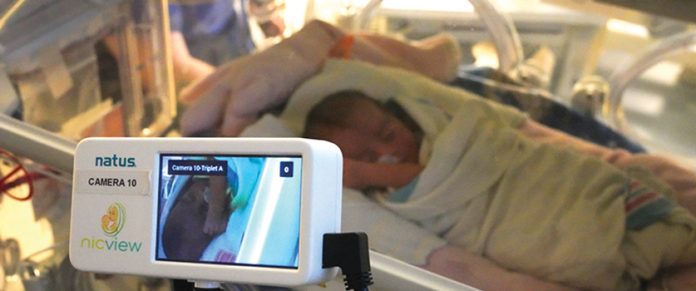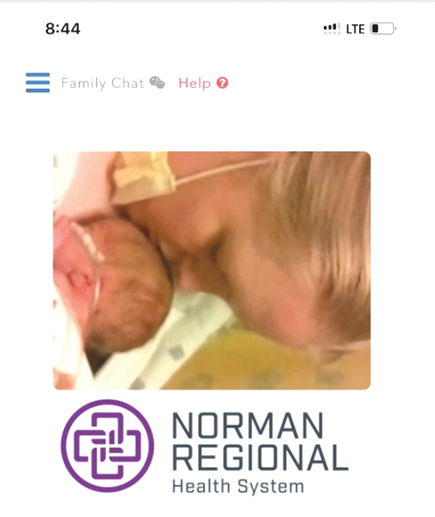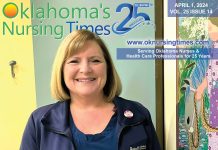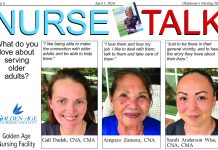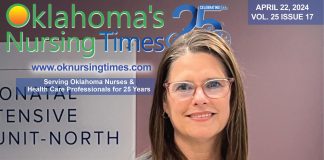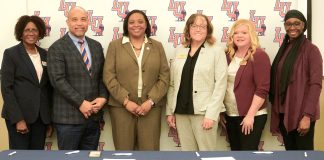The COVID-19 pandemic elevated the need for additional communication devices throughout Norman Regional Health System. When visiting capacity was limited, the only way to connect families and patients was virtually. Nurses were using personal cell phones so family members could visit with their loved ones and COVID positive parents could not be with their newborn babies. The communication need was brought to the Norman Regional Health Foundation from several healers.
“The technology existed – we just needed the funding,” Foundation Director Erin Barnhart said. “We reached out to our generous community to support communication devices for Norman Regional’s inpatient units, which included 10 cameras in the Neonatal Intensive Care Unit (NICU) and the community responded.”
The NICU cameras benefit not only moms and dads with COVID, but moms who may have had surgery and cannot visit the NICU; parents with babies who need to stay in the NICU for weeks or months; fathers who are overseas and miss the birth of their child, and grandparents or other family members who live further away or who are unable to visit due to current visitor restrictions. (story continues below)
Respiratory Complications
Keera and Kade Johnson are one set of parents who have used the NICU cameras. Keera was admitted to the Norman Regional HealthPlex at 30 weeks due to preeclampsia. Her doctor and the rest of her healthcare team wanted her to be at least 34 weeks to deliver, but weren’t sure if she would make it. Fortunately, Keera made it to exactly 34 weeks on March 1 before delivering her baby girl, Felicity, at just 3 pounds and 10 ounces.
Baby Felicity had severe respiratory issues, but thankfully she turned a corner after the first 48 hours, Keera said. Although Felicity was out of respiratory failure, her left lung still wasn’t developed enough to breathe on her own. Felicity was first in the NICU on a ventilator. She then was able to be taken off that and have a nasal cannula put in. After two weeks in the NICU, Felicity is breathing on her own and her respirations are staying normal. She’s even beginning to take bottles and recently tried breastfeeding for the first time.
Keera laughed, saying how feisty Felicity is – so much so that her NICU team have started calling her the feisty baby.
The day Keera was discharged wasn’t a happy time for her – she said she cried and cried, knowing Felicity wasn’t going home with them yet and that she couldn’t be at the hospital to visit her all day every day.
“Having that camera to just be able to open and look at any time and know she’s okay gave me peace of mind,” Keera said. “It really helped my recovery and postpartum too, to just be able to see her whenever I wanted to.
“How incredible technology is. How far we’ve come to just put a little camera over a baby in the NICU and give the family so much peace of mind.”
Keera added how much their family has loved the cameras too.
“It is such a blessing. My mom was doing the dishes the other day and she was able to set up the camera and just watch Felicity as she did her dishes,” she said. “We watch her so much, it’s almost like she’s here with us sometimes. We call it the ‘Felicity Show.’”
Their family members also got to watch via the camera as Keera held Felicity for the first time.
Triplets
NICU Baby Cameras-6.jpg (5.98 MB)Lilia and Matthew Ghibaudi are another set of parents who have happily used the NICU cameras. As they were expecting their triplets, it was expected Lilia would not go full term, but to their surprise, they found out Lilia had preeclampsia when they went to her last appointment and she had to be admitted. Lilia gave birth to three premature babies on March 4 at just 32 weeks – Natalia, Azalia and Mateo, all weighing 3 pounds – Natalia being the biggest and Azalia being the smallest.
Since the babies were premature, they went straight to the NICU, but Lilia had a cesarean and lost a lot of blood in the process so she was unable to go visit them.
“It felt weird being in the operating room without them. She just delivered these babies and now they’re immediately gone and you’re in the room without them,” Matthew said. “The cameras have been fantastic. To be able to login and have that peace of mind right away – especially for [Lilia] who couldn’t go visit them in the NICU, it has just been fantastic.”
After being discharged and leaving their triplets at the HealthPlex, the Ghibaudis also faced the concern of living 40 minutes away in Lexington, so Matthew said being able to see their babies on the cameras while at home is great. Plus with COVID and visitor restrictions, the cameras allow them to show friends and family the babies, he added.
The cameras can be accessed from anywhere at any time – allowing parents or family members to have that peace of mind whenever and wherever they need it.
“Two priorities for the Foundation are enhancing the patient experience and assisting our healers in their daily work life. These cameras support both efforts and make a difference,” Barnhart said.


